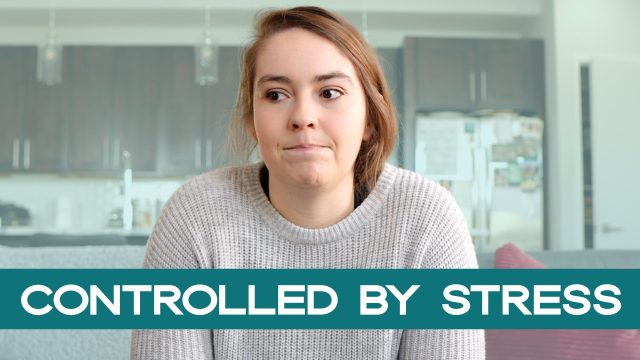I don’t know about you, but I feel like stress management is an enormous buzzword these days.
Everyone is talking about how stress affects your goals and habits:
- If you’re stressed out, you can’t maintain your habits.
- If you’re stressed out, it’s going to impact your health.
- If you’re stressed out, bad consequences are going to happen.
And then the advice they give us for stress management is, Oh yeah, eat an avocado, take a bath, go on a six day wellness retreat.
Hello! Not everybody has those abilities. Not everybody has those privileges.
I have a Ph. D focusing on mindset and behavior change. Stress management, and how stress affects your goals and habits, is something that I’m pretty familiar with from a scientific side. It’s also something I’ve watched a lot of our clients go through.
And it’s something I am personally experiencing a lot in my own life right now. So this is going to be a little bit different than my normal posts. It’s going to be more of a heart-to-heart style chat.
I’m going to talk about 3 mistakes I have made in the past that limited my ability to deal with stress, and what I am doing now instead. We’re about to get ultra-real, ultra-personal. Hopefully you’ll find some takeaways you can use in your own life.
Mistake #1: Focusing on eliminating stressors.
The first thing I want to talk about is this idea that we need to reduce our stress levels. Everybody and their brother is telling us how bad stress is, and how we need to reduce our stress levels. We need to get rid of that stress. We need to remove stressors from our lives.
At the beginning of this year, I felt like I was walking uphill through sludge the entire time. Everything felt really stressful:
-
- My business has grown exponentially in the past two years. It continues to grow, which is absolutely a blessing, but something that comes with a lot of stress. I have a team of people I’m managing now. I’m responsible for their livelihoods, in some sense.
-
- I also have other things going on with my partner.
-
- Besides that, I have a dog who needs a lot of activity. I have habits that I wanted to pick up.
-
- In the next few years my partner and I want to think about having kids. If we have a family someday, I know my double-income-no-kids life is going to get more stressful.
And I reached this point where I realized that my stress was not going away.
And so I had this moment where I was like, Karin, if you are struggling to cope with stress right now, what is it going to be like when that stress compounds itself and when more things come into the picture? When BBA continues to grow, when my family starts to grow, when we move in the future, or when we get another dog or this and that and the other thing.
NEWSFLASH: The stressors are not the problem.
There are so many things that I would not want to opt out of.
I don’t want to try to reduce stress as a way to reduce my life.
If I got rid of my business, that would significantly reduce my quality of life. I have a dog who causes a lot of stress because he’s a 95 pound black lab who needs a lot of activity. He makes a lot of demands, but I would never even think of getting rid of him. And so I had this moment where I was like, I do not want to reduce my stressors.
Sooo….
Instead, focus on increasing your ability to cope and be resilient.
That is lesson number one about how stress affects your goals and habits: Where do you need to focus less on stress reduction? Where can you focus more on increasing your ability to cope and be resilient? Stress exists in your life, and it is going to continue to exist.
Mistake #2: Adding stressors without adding support
This brings me to another mistake I’ve made frequently in the past and many people that I work with have also made: We are constantly taught to add demands to our life without adding support.
Everybody’s telling you to adopt another habit; telling you to pick up that extra shift at work; to do more, more, more. Add more to your plate. Exercise. Eat healthy. Go to the gym. Walk outside. Get early exposure to daylight.
All of these self-development habits we’re told adopt, adopt, adopt. But that is like putting weight on a barbell over and over again without providing additional support in the form of strength. This is something that I’ve realized in my own life. I had this moment at the beginning of the year where I was adding all of these things:
-
- I was going to run a half marathon.
-
- I was going to build my business in specific ways.
-
- I had a very specific habit stack I wanted to be doing.
-
- I wanted to be tidying.
-
- I wanted to be going for a walk every day.
-
- I wanted to be interacting on social media at a certain time.
-
- I was adding and adding to my self-development plate.
At the same time, I was trying to reduce the amount of money I was spending. So I was cutting that coffee that brought me joy. I was getting rid of my one-on-one nutrition coach. I was reducing the amount of money that I spent on things like a housekeeper that comes in once a month.
All of a sudden I looked at myself in the mirror and I was like, okay, I’m asking myself to do more and taking away the resources and support that I need in order to do it. That makes zero sense.
Instead, focus on adding support so that you can handle more stressors
Something I have shifted in the past 25 days is reducing demands on myself. I’ve focused on the things that really matter, and given myself the wiggle room to provide myself more support.
For example, I want to be able to focus at work. So I got a WeWork membership so I can be outside of the house and have concrete work-life boundaries.
Now, I want to say that not everybody is going to be in a position where they can financially add support, but financial support isn’t the only support that exists. Maybe that means reaching out to an organization in your community to see if they can help you out with food or other resources like that.
Maybe that means reaching out to your friends and family and saying, Hey, we’re going through a really hard time. Would you be able to send over a frozen meal? Or would you be able to watch the kids a little bit more? Or would you be able to help me clean on a certain day?
Support doesn’t have to be financial, it can be relationship based, or adopting technology automation, or a number of other things.
If you want to learn more about all of those things, I would highly suggest joining Change Academy as a form of support that is specifically created for you on your change journey. Social support is a huge thing. We have an immense amount of social support in inside of Change Academy.
That’s lesson number two: If you’re going to add a habit, what are you going to add to help support yourself? If you’re going to add a demand, where is the support coming from that you need to meet that demand?
Mistake #3: Allowing habits to be annoying
And the third lesson that I’ve learned recently relates to my Core 4 habits.
If you don't know that phrase, I have a free resource called the Future Self Map Mini Course. It helps you identify exactly who you want to be and choose habits to get you there. It's a protocol that lots of people inside Change Academy follow very successfully to change their lives and behavior.
Anyhow, I was viewing my Core 4 habits as annoying boxes I had to check. I was trying to read a little bit more at night and I was like, I’m going to read 10 pages every day. Sitting down, I would be like, Ugh, I have to read those 10 pages and I would fly through them as quickly as possible.
Another of my habit goals was to do 5 minutes of tidying every day. So I would get up, set a timer, try to not even think about it and just clean as fast as possible until the timer went off.
Instead, focus on the value-add of your habits
There’s actually research that supports the idea that when we view habits as annoying pieces of our day, instead of things that bring us joy and fulfillment and connection to our values, they add stress to our lives. But when we view them as enjoyable, when we’re mindful, when we connect those behaviors to our values and focus on that, then they actually help reduce the symptoms of stress that we are experiencing.
I had to call myself out and I was like, Listen Karin, you are either going to embrace and learn to love and be mindful of these habits or don’t do them. If you don’t want to do them, don’t freaking do them.
And the answer was that I wanted to do those things. I wanted to go on a walk with my dog. I wanted to tidy my kitchen. And by really focusing on my enjoyment of those tasks, thinking about how they embody my connection to my future self, and really diving into the meaning behind them, that focus has completely shifted my relationship with those habits.
So that’s takeaway number three about how stress affects your goals and habits: If I’m asking myself to do specific tasks or do specific habits, am I viewing them as annoying things that have to be done in order to check a box? Or am I actually allowing myself to embrace them, and become the person they represent?
If you loved this post, make sure you look into joining Change Academy.It's low cost, it's $35 a month, which is nuts for the amount of information and community and stuff that you're getting every single month. I am shifting a lot more of my sort of behind the scenes content like this to being inside of Change Academy, so members there are always getting the behind the scenes scoop. They're always getting the real techniques and tips that I'm using. Additionally, they're getting the scientific education in the workshops that obviously we are doing every month.
I’ve been focusing a lot on stress this month because that’s what our topic was inside of Change Academy. If this chat about how stress affects your goals and habits resonated with you, make sure you check out my videos on this topic, which are all about concrete tips for increasing your ability to cope with stress.




